Understanding Different Types of Bearings for Industrial Applications
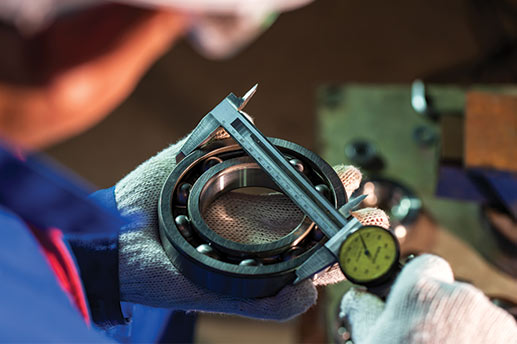
Bearings are essential components in virtually all industrial machinery, enabling smooth rotation, reduced friction, and supporting loads in various applications. Understanding the different types of bearings and their specific advantages is critical for ensuring efficient, long-lasting operations. In this guide, we’ll explore the various types of bearings and their industrial applications to help you make informed decisions for your equipment.
Ball Bearings
Deep Groove Ball Bearings
Deep groove ball bearings are the most commonly used bearings across industries due to their versatility, reliability, and ability to handle both radial and axial loads. Their simple design allows for high rotational speeds with minimal noise and vibration. Available in various configurations, such as single-row, double-row, and precision types, they are suitable for applications like: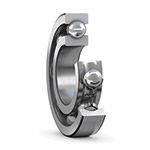
-
Gearboxes
-
Electric Motors
-
Conveyor Systems
-
Automotive Components
-
Medical Equipment
The ease of installation and low maintenance requirements make deep groove ball bearings ideal for industries that prioritise efficiency and performance over extended periods.
Angular Contact Ball Bearings
Angular contact ball bearings are designed to manage combined loads (both radial and axial), making them perfect for applications that demand high load-carrying capacity. These bearings are available in single-row, double-row, four-point, and thrust configurations to cater to various mechanical setups. Common applications include: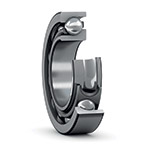
-
Machine Tools
-
Automotive Transmissions
-
Pumps
-
Turbines
Their precise construction allows for high accuracy and durability, even in demanding environments.
Self-Aligning Ball Bearings
When misalignment is a concern, self-aligning ball bearings provide a robust solution. These bearings can automatically adjust to misaligned shafts without affecting performance, reducing friction and heat build-up. This makes them suitable for high-speed applications in industries like: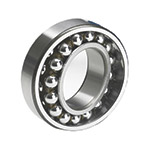
-
Textile Machinery
-
Agriculture
-
Industrial Fans
-
Centrifugal Pumps
With their low noise and reduced maintenance needs, self-aligning ball bearings are often chosen for applications where precision and reliability are critical.
Thrust Ball Bearings
Thrust ball bearings are specifically designed to handle axial loads at low speeds, making them ideal for applications such as: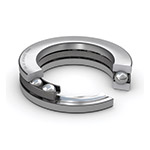
-
Steel Production
-
Injection Moulding Machines
-
Mining Equipment
These bearings come in single or double-direction configurations, accommodating loads in both directions when needed. Thrust ball bearings are engineered to offer smooth, reliable performance even under heavy axial pressure.
Roller Bearings
Roller bearings are designed for heavier loads and can handle more demanding conditions compared to ball bearings. Their rolling elements provide greater contact surface area, enabling them to support higher radial loads.
Cylindrical Roller Bearings
Cylindrical roller bearings consist of cylindrical rollers between two raceways. Known for their high radial load capacity, these bearings can also accommodate some axial displacement. They are suitable for applications such as: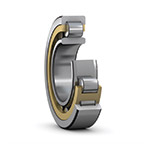
-
Industrial Gearboxes
-
Pumps
-
Electric Motors
-
Wind Turbines
Their robust construction allows them to function efficiently even in high-speed environments, providing durability and longevity.
Spherical Roller Bearings
Spherical roller bearings excel in applications where there is shaft misalignment or angular rotation. Their self-aligning feature ensures smooth operation under heavy radial and axial loads, even in harsh environments. Industries that rely on spherical roller bearings include: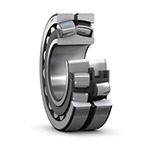
-
Mining
-
Construction
-
Energy
-
Material Handling
Their rugged design makes them ideal for heavy-duty operations where reliability is paramount.
Taper Roller Bearings
Taper roller bearings are specially designed to handle both radial and axial loads, making them suitable for use in applications like: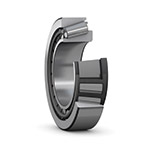
-
Automotive Axles
-
Gearboxes
-
Machine Tools
These bearings are capable of supporting high loads and are commonly used in equipment that requires a high degree of precision and stability under heavy loads.
Needle Roller Bearings
Needle roller bearings are a subtype of roller bearings with slender, cylindrical rollers that offer a high load-carrying capacity in a compact form. These bearings are particularly useful for applications where space is limited, but a high load capacity is needed, such as:
-
Automotive Transmissions
-
Aerospace Components
-
Hydraulic Pumps
Despite their small size, needle roller bearings can withstand heavy loads, making them ideal for high-performance, space-constrained applications.
Conclusion
Selecting the right type of bearing for your industrial application is crucial for ensuring operational efficiency, longevity, and reducing maintenance costs. Whether you need ball bearings for high-speed, low-friction applications or roller bearings for heavy loads, understanding the specific advantages of each type can help optimisze performance across various industries.
How ACORN® Can Support Your Bearing Needs
Need help finding the right bearings for your industrial applications? Get expert advice from ACORN’s Bearing Product Manager, Andy Fletcher, and discover the best solutions tailored to your industrial applications or contact us today to discuss your requirements.
